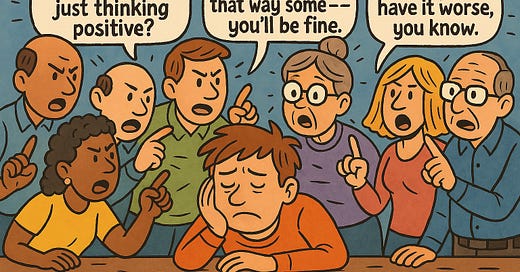
I can tell you both from personal experience in my own mental health journey and as someone who has worked in the mental health field there is a lot of advice that is helpful, but there is also a lot of advice that does more to overwhelm you, cause self-doubt, or lead you to question your progress. If you have felt pulled in too many directions or pressured to meet someone else’s version of “healing,” you are not alone. The good news? You have the power to protect your journey, take in what helps, and let go of what does not. Here are five ways to stay grounded, get the right support, and define healing on your terms.
Your Journey Is Yours—Exactly as It Should Be
It is natural to compare yourself to others, wondering why someone seems to cope better or heal faster. But mental health is individual. There’s no one-size-fits-all because every mind, body, and life story is different (American Psychological Association, 2023). What helps one person might not work for you, and that is okay. You deserve the time, tools, and pace that fit you. Own that without apology.
Not All Advice Deserves a Front Row Seat
Even well-meaning people can get it wrong, sometimes wrong. Research indicates that when others minimize or dismiss your emotions, it can lead to increased stress, doubt, and emotional pain (Marigold, Holmes, & Ross, 2007). When advice comes your way, check in with yourself:
Does this person understand mental health?
Do I feel heard or judged?
Is this compassionate or just an opinion?
Does it help me feel better?
You do not have to take in every word. Filtering is essential.
Boundaries Are Mental Health Essentials
Boundaries protect your emotional well-being. They do not make you “difficult”—they make you healthy. Setting boundaries can sound like:
“I’m not comfortable discussing this.”
“Thanks for caring, but I’m handling this in my way.”
“Can we change the subject?”
Research shows that healthy boundaries reduce stress and protect emotional energy (Brown, 2019). You do not owe anyone full access to your mental landscape.
Support Systems Matter
We all need support, but the right kind matters. Support that is empathetic, understanding, and safe improves mental health and resilience (Ozbay et al., 2007). The right people listen, encourage, and respect your choices. If you do not have that yet, seek it—whether through peer groups, online communities, mental health professionals, or trusted friends. You deserve support that lifts you.
Healthy vs. Unhealthy Support:
Healthy:
Listens without judging
Encourages your choicesRespects your boundaries
Is reliable and they have a good understanding of various systems and treatments that can help and support you
Validates your feelings
Unhealthy:
Dismisses your emotions
Pushes unsolicited advice
Ignores boundaries
Is inconsistent and not based in facts.
Undermines your self-worth
The right support leaves you feeling seen and lighter. The wrong kind drains you. Pay attention to how you feel after.
Let Values—Not Fear—Guide You
One major mental health trap? People-pleasing. Pressure to appear “fine” or meet others’ expectations can be harmful. But when your choices align with your values, mental well-being improves (Deci & Ryan, 2008). Ask:
Does this move me closer to the life I want?
Does it reflect what matters to me?
Am I acting from self-respect or fear?
Small, values-based steps create lasting change.
Bottom Line: You Define Your Healing
Your journey is yours, not social media’s, not your family’s, not your friends ’. You get to choose the support you take in, set the boundaries you need, and define healing in a way that fits who you are. The more you tune into yourself and tune out the noise, the steadier and stronger you will become.
References
American Psychological Association. (2023). Understanding mental health as a continuum. Retrieved from https://www.apa.org Brown, B. (2019). Dare to lead: Brave work. Tough conversations. Whole hearts. Random House
Deci, E. L., & Ryan, R. M. (2008). Self-determination theory: A macrotheory of human motivation, development, and health. Canadian Psychology, 49(3), 182–185. https://doi.org/10.1037/a0012801
Marigold, D. C., Holmes, J. G., & Ross, M. (2007). More than words: Reframing compliments from romantic partners fosters security in individuals with low self-esteem. Journal of Personality and Social Psychology, 92(2), 232–248. https://doi.org/10.1037/0022-3514.92.2.232 Ozbay, F., Johnson, D. C., Dimoulas, E.,
Morgan, C. A., Charney, D., & Southwick, S. (2007). Social support and resilience to stress: From neurobiology to clinical practice. Psychiatry (Edgmont), 4(5), 35–40.




Thanks for this article. It made me pause. My son is ADHD and I struggle to say the right things in the right way.
THIS THIS THIS